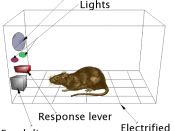What is learning? According to Hergenhahn and Olson (2005), learning is defined as " a relatively permanent change in behavior or behavioral potentiality that comes from experience and cannot be attributed to temporary body states such as those induced by illness, fatigue, or drugs" (p. 8). The study of learning is important because it gives us a greater comprehension of how behavior is learned. By understanding the learning process we can manipulate the environment to encourage normal behavior that is adaptive and avoid maladaptive and abnormal behavior. Understanding the principles of learning can also produce more effective results in both psychotherapy and educational practices.
The study of learning has yielded various learning theories that are categorized into different paradigms. Hergenhahn and Olson (2005), define a paradigm as "a viewpoint shared by several scientists that provides a general framework for empirical research, and is usually more than just one theory" (p.
24). Two of the major paradigms are the functionalistic and associationistic paradigms.
DiscussionWithin the functionalistic paradigm, theorists influenced by Darwin, attempt to explain learning by discovering and researching how mental and behavioral processes are related to an organism's adaptation to the environment (Hergenhahn and Olson, 2005). There are three main theorists whose theories are predominately functionalistic. These theorists include Edward Thorndike, Burrhus Frederick Skinner and Clark Leonard Hull. The first theorist, Edward Thorndike proposed the theory of connectionism which linked sensory events to behavior and described the bond between stimuli and response as a connection. By conducting research with animals, Thorndike concluded that learning is achieved through a process of trial-and-error and that learning is incremental. He also concluded that learning is a direct process that does not require thought and reason. He believed that all mammals learn in the same manner. Thorndike also proposed the theory of transfer...


